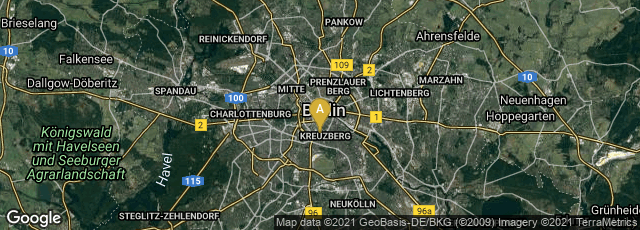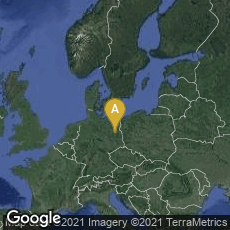

A: Bezirk Friedrichshain-Kreuzberg, Berlin, Berlin, Germany
On December 1, 2002 the ECHO initiative was announced in Berlin. Funded by the European Commission, it was founded by the Max Planck Institute for the History of Art in Rome, by the Max Planck Institute for Psycholinguistics in Nijmegen, and by the Max Planck Institute for the History of Science in Berlin, together with their international partners.
"The new European Commission-funded project ECHO (European Cultural Heritage Online) to create an IT-based infrastructure for the humanities is taking shape today with its kick-off-meeting held in Berlin. With a budget of approximately 1.6 million Euros 16 partners from 9 European countries including candidate countries together with their subcontractors, the initiative aims at achieving four major goals, scientific, technological, cultural and political, until May 2004:
"By 1) improving the situation for the humanities concerning the new information technologies through
"2) the fostering of a new IT-based infrastructure, adequate to future information technologies,
"3) cultural heritage in Europe will be brought online and
"4) be made freely accessible without any commercial constraints.
"The project, coordinated by the Max Planck Institute for the History of Science in Berlin, is highly welcomed by the EU commission as a chance to strengthen the competiveness of European research by promoting an urgently needed concept for good practice in scholarly research in the humanities. In order to exploit the innovative potential of the new information technologies, the project will contribute to overcome the present fragmentation of approaches to transfer cultural heritage to the Internet.
"At present Europe lags behind in developing a large-scale infrastructure for the humanities adequate to the Internet age and competitive with similar ventures in the US. As a Europe-wide effort, ECHO aims at developing high-quality research in line with the ambition of the European Research Area and competitive with US and Japanese ventures. Only by overcoming the limitations of national perspectives can the critical mass be brought together that ensures the self-organisation of culture in the new medium.
"If the new media comprises an adequate representation of human cultural diversity they can offer also new opportunities reflecting on possible links and similarities e.g. between European and non-European cultures. A culturally informed Web may thus even constitute a public think-tank in which cultural diversity drives rather than conflicts with communication.
"The ECHO project is constituted by its main partners as well as by subcontractors. Even now, however, the informal network of actors willing to contribute extends far beyond the group of applicants. Some 25 academic, governmental, and private institutions from 15 European and 3 non-European countries (China, Mexico, and the USA) have declared their adherence to the project; they will be contacted during its first phase.
"The single most important added European value offered by the project to the citizens of Europe is a contribution to the preservation of, and an improved and extended access to, their own European cultural heritage. Its enhanced availability on the Internet will also create new opportunities for shaping a polyvalent European identity, including a realisation of the non-European origins of essential presuppositions of European culture as well as an awareness of its historical pitfalls. Border-crossing technologies such as language tools adapted to cultural sources contribute to European integration by making these treasures accessible to all Europeans (e-Europe). ECHO will provide web-accessible multimedia content together with navigation facilities, hence making it attractive for researchers, teachers, students, journalists, and also for the general public.
"In addition, the ECHO project will be directly concerned with copyright laws and open source policies. It will provide an opportunity for reflecting on the ongoing developments from a practical point of view and may lead to the definition of new policies encouraging the transfer of cultural heritage to the existing and new media.
"The project is defined in three major steps.
"• An assessment of the present situation in relation to bringing European cultural heritage online. In view of the fragmentation of endeavours presently undertaken, it is necessary to assess the implementation of Information Technology for preserving, sharing, and studying this heritage in different disciplines and nations.
• The exploration of a novel IT-based cooperative research infrastructure. The project will create, within its limited scope, a model implementation of a new cooperative research infrastructure, that aims at mobilising and bringing together all relevant actors (universities, museums, libraries, archives, (national) research councils, digital heritage organisa-tions, and companies) in the broad field of the humanities and cultural heritage in Europe.
"• A paradigmatic proof of the new potentials for research offered by this infrastructure. By taking up four paradigmatic content areas in the humanities, from the history of art, the history of science, language studies, and social and cultural anthropology, respectively, the project aims at demonstrating the innovative potential for research offered by this infrastructure.
"The highly ambitious ECHO project aims at the creation of a progressively growing agora, defining the management structure, data formats, tools and workflows. This in turn is intended to serve as a model for a larger-scale network within the 6th Framework Program of the EU. The subsequent project, possibly labelled ECHO 2, shall bring a major contribution to the preservation of Europe's cultural heritage as well as improved and extended access to this heritage for both scholars and the general public alike. This transformation of the Internet into a semantic web allowing the exchange and processing of information in the language of human culture within an emerging Open Library will serve as a framework for cooperative work on the sources and for the presentation of its results. It will also show socio-economic effects such as becoming a central resource of technology for storing and distributing information for institutions who lack such means; or for creating a basis for virtual tourism into the digitised realm of our rich cultural heritage in Europe."